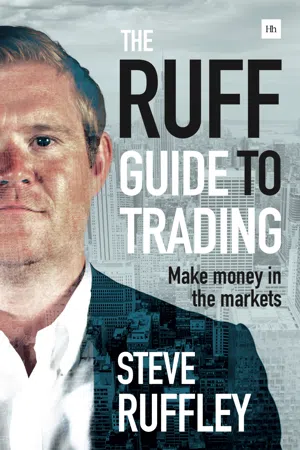
- English
- ePUB (mobile friendly)
- Available on iOS & Android
About this book
If it's trading, then Steve Ruffley has seen it and done it!Steve Ruffley has been involved in the finance industry for 15 years and is currently chief market strategist and head of education at InterTrader. In his Ruff Guide to Trading, he shows you the markets through his eyes. He reveals how he sees trading as a whole, how he assesses and exploits trading opportunities, and how he thinks about risk. He also describes three of his winning strategies.The focus of the Ruff Guide is intraday trading; everything covered relates to finding and making money from short-term trading opportunities that arise as part of everyday market moves.At the heart of Steve Ruffley's approach is a very simple 80-20 rule for understanding market movement. This is that market moves are 80% technical and 20% fundamental. He explains the fundamental and technical aspects you need to use to get the right balance in your market analysis and shows how to put these into practice with examples from real-life market action.Steve also explains why success at trading first requires you to understand yourself and your fellow traders, and provides guidance to help you gain this understanding.The Ruff Guide is the result of Steve Ruffley's thousands of hours of trading, charting and teaching experience. Pick it up to follow the simple and accessible guidance of someone who has seen and done it all before.
Frequently asked questions
- Essential is ideal for learners and professionals who enjoy exploring a wide range of subjects. Access the Essential Library with 800,000+ trusted titles and best-sellers across business, personal growth, and the humanities. Includes unlimited reading time and Standard Read Aloud voice.
- Complete: Perfect for advanced learners and researchers needing full, unrestricted access. Unlock 1.4M+ books across hundreds of subjects, including academic and specialized titles. The Complete Plan also includes advanced features like Premium Read Aloud and Research Assistant.
Please note we cannot support devices running on iOS 13 and Android 7 or earlier. Learn more about using the app.
Information
Introduction
Theory and Understanding
Chapter 1.
Trading FAQs
Introduction
1. Why do people trade the markets?
2. How do you, Steve Ruffley, trade the markets?
- I understand what has happened in the past to predict future movement – 80% technical analysis.
- I study the underlying opinions on data, news and sentiment to find out what traders may be basing their calls on – 20% fundamental analysis.
- I understand how to identify value in a market and how long it will be available on an intraday basis.
- I set a risk amount (in money) that I am willing to lose against a reward amount to prove my opinion is correct or incorrect.
3. What are your sources for new information that is not on the charts?
Scheduled data ev...
Table of contents
- Contentsx
- About the Author
- Preface
- Introduction
- Part II. Practical Strategies
- Conclusion
- iView Charts